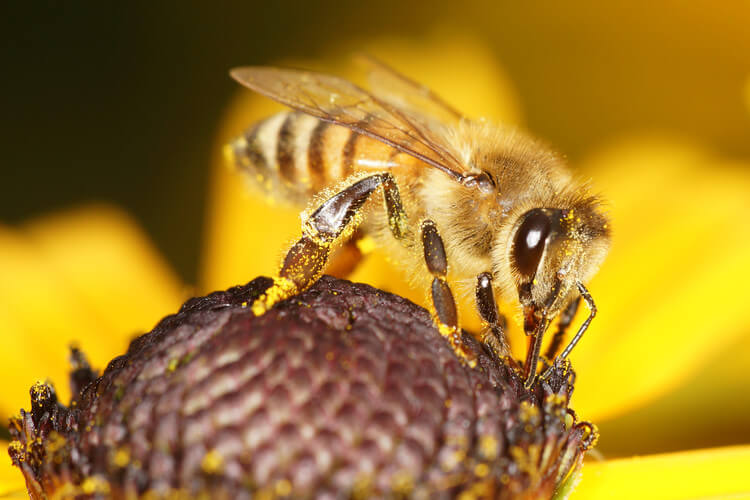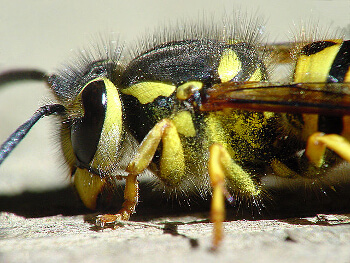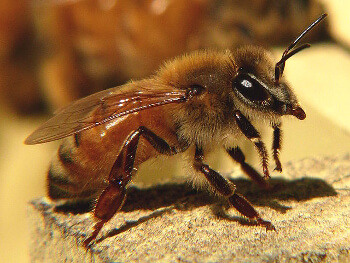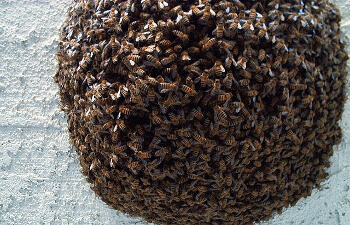Ricochet is the best place on the internet to discuss the issues of the day, either through commenting on posts or writing your own for our active and dynamic community in a fully moderated environment. In addition, the Ricochet Audio Network offers over 50 original podcasts with new episodes released every day.
 Ask the Expert: How I Learned to Stop Worrying and Love the Bees
Ask the Expert: How I Learned to Stop Worrying and Love the Bees

You’re afraid of this enterprising little lady? Seriously?
I should start this piece with a disclaimer: As far as beekeeping goes, I am a relative expert. This is only my second year of the hobby, which makes me a solid novice. However, beekeeping is an all-or-nothing commitment in that you either work with thousands of bees, or you don’t work with any. Most people fall into the latter category, so I can comfortably venture that — even as a novice — I’ve had more exposure to bees than most non-beekeepers will have in their lifetimes. On the other hand, I know that there is at least one other beekeeper on Ricochet, and she’s been at it about ten times as long as I. So, rather than focus on truly expert points, I will focus on points that a non-beekeper might find useful, specifically ones that show that honeybees, unlike wasps or hornets, aren’t all that scary.
Q: Aren’t honeybees aggressive like wasps or hornets?
A: Different strains have different levels of aggression, but on the whole, no. One of the most popular strains of honeybee is the Ligurian (or Italian), which is the strain of bees that the ancient Romans kept. It’s been domesticated for thousands of years and it shows.

Hi! I’m a Yellow Jacket. I’m a jerk.
Q: What does a honeybee look like, as opposed to a yellow jacket (wasp)?
A: Honeybees are smaller, browner, and are colored less brightly. Honeybees are also fuzzy; yellow jackets have some, but not a lot, of fuzz.
Q: If honeybees are not aggressive, why did one sting me?
A: If a honeybee stings, it is because it thinks that its life or its hive is threatened. Most people never come near a beehive, so the bee probably thought that its life was threatened. If a bee lands on you, don’t swat. Instead just watch, it will fly away on its own.
I have been stung only twice in two years and both times were my fault. The first time, there was a bee on the webbing of my thumb. I did not see it, closed my thumb, and squeezed the bee. The bee defended itself. The second time, I was inspecting the hive and one of the boxes fell to the ground. The bees thought, correctly, that their hive was threatened. So don’t threaten them, remain calm, and they most likely won’t sting you.
Q: Don’t honeybees die after they sting?
A: Yes, they do. Unlike wasps and hornets, honeybees have a barbed stinger: When used, the stinger is ripped out of its body and then it soon dies. So, unlike wasps and hornets, there is a cost for a honeybee to sting you. The honeybee instinctively knows this and will only sting if it thinks it must.

Hi! I’m a Honeybee. I’m fuzzy.
Q: Why do honeybees land on people?
A: Honeybees are foragers. They are looking for pollen, and sometimes they are looking for salt. Salt helps cure their honey. If a bee lands on you, it likely wants to lick off some salt and return to its hive. Not so threatening, right? If bees landing on you is a problem, buy a little salt wheel at a pet store and place it outside but protected from rain. The bees will eventually find it and begin to leave you alone.
Q: A honeybee landed on me and its stinger was twitching. That means that it was going to sting me, right?
A: No. What’s more, I think that this misunderstanding is the top reason why most people get stung by honeybees. Honeybees have a biology very different from that of mammals. Honeybees breathe through holes in their abdomens, which are sectioned and work like bellows. So when you see that a honeybee’s abdomen is pulsing, it’s merely breathing, not signaling aggression. So, don’t panic, don’t swat, and you won’t get stung.
Q: There are always bees around my swimming pool. Why?
A: Like every other living thing, bees need water. Check if there is an apiary nearby. If so, let the beekeeper know. He can set up an alternate water supply. Whether or not the bees will prefer the new supply over your pool is up to the bees.

Won’t you help the hiveless?
Q: There is a swarm of bees in my yard, What do I do?
A: First off, remain calm. Believe it or not, despite what over-hyped news stories or horror movies would have you think, honeybees are actually their most docile when swarming. Honeybees only swarm because their previous hive is no longer optimal. Usually, it is overpopulated. When they do swarm, they are looking for a new home. And since they have no home, they have no home to defend. And since they don’t want to set up a new home near threats, they will most likely avoid any threats. So, contact a local apiary. Honeybees are expensive. A beekeeper will gladly come out, adopt your swarm of no-cost bees, and remove them from your yard.
In just my short amount of time beekeeping, I can say that it is the most rewarding hobby I’ve taken up. Honeybees are very cool little creatures that you only begin to really appreciate once you start keeping them. The other reward is, of course, honey. Later today I will be prepping one of my hives for a harvest on Sunday. I expect to get about three gallons of wild sweet clover honey.
I am available for any beekeeping related questions you might have.
Are you a Ricochet member with an expertise of your own you’d like to share? See editor Tom Meyer’s post on how you can. Not a member? You can fix that here.
Published in Culture



Since I am a lazy tender of my suburban lawn, and the builders plowed away all of the topsoil and replaced it with rocks, grass grows poorly. However, clover has taken over instead (which is good as, over time, clover replenishes the nitrogen in soil). My yard is almost always full of bees, and they are a treat to watch. A few stings happen, usually when barefoot kids step on the bees, but (if you are careful) you can actually pet the bees while they are foraging.
In addition to honey bees, we also get digger bees (they look like small bumblebees), and carpenter bees (which keep trying to destroy my deck). On really warm days you can always hear a slight drone from the yard.
Amazing! Thanks for sharing!
I love bees! And I’ve always had a secret desire to become a bee keeper. Funny, that. I love your post, and I love wild honey.
I have to share a story:
Last fall my husband was complaining (quite literally like a crazy person) about a humming he heard in our bedroom. I didn’t hear anything. I tried to listen hard to assure him I care, but I heard absolutely nothing. I honestly thought the poor man was having some inner ear disorder. He furtively looked through armoires and examined lamp shades and every electric item on his bedside table, and was consumed by this “humming” which kept him up at night.
The next day I was outside our bedroom checking on our lime tree with the dogs, and saw, low and behold, hundreds of bees in the soffit beneath our roof. And boy were they humming! My husband literally heard this huge colony through the walls! And I was thinking the poor man was over worked and in need of a vacation. To the contrary, now I know he has special hearing powers.
I did just what you said and called a local beekeeper to come and get them. But there was a big part of me that wanted to cultivate the colony myself.
Apparently the state of Iowa has a program to promote the bee population. They are paying farmers to set aside some acres for wildflowers. My uncle found out about it, and now I’ve got 10 acres of wildflowers across the crick. (They were planted late and haven’t bloomed yet, and it may be another month before I actually see flowers. But next year I may start to see more bees around.)
My wife likes to try and pet them if they land on her. If they land on me, I just watch.
Thank you. And thanks for reading.
If you can do it, I highly recommend it. Thanks for reading.
As a beekeeper, I think it’s interesting. As a taxpayer, I’d tell the State to plant wildflowers along the highways.
To bee or not to bee?
2 is not enough to start a colony. I’m pretty sure you need at least 3.
Thanks Rick. I have to admit that I’ve been wary of bees since I was a teenager and found out the hard way that I was allergic to their stings. A bee sting anywhere on my body would result in a relatively violent reaction – swelling of my tongue and throat, a rapid pulse and difficulty breathing that required a visit to to the ER. Testing and desensitization treatment by an allergist over time eventually solved the problem. The last time I was stung (about 30 years ago) resulted in nothing more than localized swelling and itching at the site of the sting. Again, though, I still keep my distance from them.
Most excellent! A great primer on honeybees.
I’ve heard honeybee population has been decreasing. Is this true?
Anyone into bees would enjoy Uneasy Money by P. G. Wodehouse. The audio version is here.
Seawriter
Fear due to allergy I understand. Thanks for reading.
Thank you, Susan.
There’s been an increase in what is called Colony Collapse Disorder. The jury is still out as to a definitive cause.
Great post, Rick.
Oh, did you put a linking comment back on Tom’s solicitation (Re-Soliciting Expertise, or whatever it was called) thread?
Thanks for reading, Arahant.
No, let me do that now.
If you could do that, that would be great.
Why did you take up beekeeping?
How much did your colony cost and where does one go to buy bees?
How likely is it that an African killer bee queen might kill yours?
Is it true that beekeepers have contracts with farms for pollination purposes?
Do your neighbors find it annoying that you have a swarm of bees nearby?
And how many hives do you have, Rick?
Sounds kind of personal . . . but I’m curious too!
Also, why don’t the bees attack you when you go in and steal all their food?
and what do you do with the bees when the winter comes and they can’t forage?
Two questions:
You say that beekeeping is an all-or-nothing commitment. Do you mean a large time commitment, attention commitment, or both?
I have cats. They are, of course, curious. You say bees attack when they feel threatened. Do you have pets? If so, is there a concern there?
Thanks for the piece. I think beekeeping would good for our local agriculture and for the bees too.
Sam
My wife and I had talked about it from time to time. It’s an old world skill that produces barterable goods.
I think it was $180.00 for a starter colony of about 3,000 to 5,000 with a queen. I was walking into a local farm supply store in February and they had an “Order your bees here” notice on the door. However, I would look for a dedicated bee supply store. Yes, they exist.
No clue, although I doubt that it’s very likely. I live in Wyoming. I think Africanized bees keep to the far southern parts of the US.
Yes. It’s one of the ways to make money at the hobby. However, I think that it’s mostly the large, commercial apiaries that do it. I could be wrong though.
They almost never notice. In fact, after our first harvest last year, I gifted our immediate neighbors some honey for putting up with the bees. Neither neighbor had any clue that we kept bees. This spring, my hive did split into two and one of the groups took up residence in one of my neighbor’s spearmint bushes. She called me. I removed them. She got some honey for her trouble, and I got my bees back to start a second hive with.